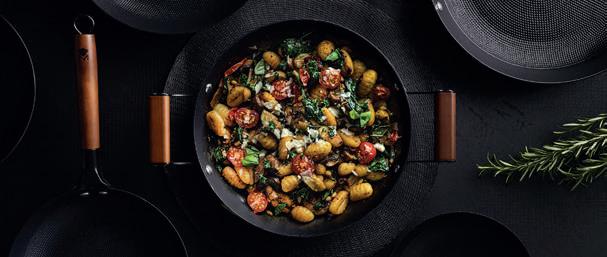
14 minute read
How to choose good kitchenware Cómo escoger un buen menaje de cocina
Have you ever asked yourself what the most appropriate kitchen utensils are? Have you ever wondered whether a cast iron frying pan is better than a stainless steel one? The answer will depend on many factors, but mainly on what kind of cooker you have and what dishes you usually prepare. / ¿Alguna vez te has planteado cuáles son los utensilios de cocina más adecuados? ¿Te ha surgido la duda sobre si es mejor una sartén de hierro fundido o de acero inoxidable? La respuesta depende de muchos factores, pero principalmente de cómo sea tu cocina y de los platos que suelas preparar.
Firstly, you should know what the components are: handles, finishing touches, body, edges, base, sides… Each one of these influences the functionality of the utensil. For example, the vertical sides of a frying pan are ideal for boiling on a low heat, while open-sided or bell-shaped pans help to reduce sauces and stocks that are prepared using evaporation.
Advertisement
The second thing to keep in mind is the material, as each has their own pros and cons. Cast iron is very resistant and distributes heat evenly, but it is quite heavy and takes longer to heat up; it is very useful for cooking at a low heat, for example. Stainless steel preserves the flavours well – it is ideal for stews, sauces and soups – but tends to be less economical. On the other hand, aluminium has excellent heat conductivity, but tends to lose its shape easily.

It is also important to know what type of cooker you use. If you use induction, the best frying pans will be those with a full induction base or edge-to-edge.
How do you plan to use the kitchenware? This is an essential question, as each utensil is ideal for different types of cooking and preparation. Frying pans are for frying, sautéing or searing; saucepans are for creating and reducing sauces and cooking small vegetables; while a deep pan is your best choice for roasting, stewing, deglazing, poaching and frying.
Lastly, knowing how many people you are cooking for will help you to choose the size of your kitchenware set. Deep frying pans with a wide base will give you maximum conduction of heat, which may make it the most useful if you are cooking for several people.
We hope that this short guide will make it easier for you to buy your kitchenware. And if you have any questions you can write to info@cookandchefinstitute.com and we will help you.
Lo primero que debemos conocer son los componentes: mangos, asas, remaches, cuerpo, borde, base, paredes… Cada uno de ellos influye en la funcionalidad del utensilio. Por ejemplo, las paredes verticales en una sartén son ideales para hervir a fuego lento, mientras que las abiertas o acampanadas ayudan a reducir salsas y caldos de cocción por evaporación.
Lo segundo que hay que tener en cuenta es el material, pues cada uno tiene sus ventajas y sus inconvenientes. El hierro fundido es muy resistente y distribuye de manera uniforme el calor, pero es bastante pesado y tarda más en calentarse; resulta muy útil, por ejemplo, en las cocciones a fuego lento. El acero inoxidable preserva bien el sabor —es ideal para guisos, salsas y sopas—, pero suele ser menos económico. El aluminio, por otro lado, tiene una excelente conductividad térmica, pero tiende a deformarse con facilidad.
También es importante saber qué tipo de cocina usas. Si tienes inducción, las mejores sartenes serán aquellas que cuentan con base de inducción completa o de extremo a extremo.
¿Qué uso pretendes dar al menaje? Esta pregunta es esencial, pues cada utensilio es idóneo para tipos de cocción y preparaciones diferentes. Las sartenes sirven para freír, saltear o marcar; los cazos, para crear y reducir salsas y cocinar pequeñas verduras; mientras que una sartén honda será tu mejor aliada para asar, estofar, desglasar, escalfar y freír.
Por último, saber para cuántas personas vas a cocinar te ayudará a elegir las medidas de tu batería de cocina. Las sartenes hondas con una amplia base permiten una conducción de calor máxima, por lo que pueden serte más útiles si cocinas para varios comensales.
Esperamos que con esta pequeña guía te resulte más sencillo comprar tu menaje de cocina. Si tienes cualquier duda, puedes escribirnos a info@cookandchefinstitute.com y te ayudaremos.
¿Can you imagine cooking your next meal in a turtle shell, or having to submerge hot stones into a pit in order to boil water? It may seem far-fetched, but the first humans cooked with whatever they had. Fortunately, today we have different and innovative utensils that respond to our cooking requirements.
If you want to rely on a good cookery “toolbox” you need to understand the logic behind each utensil. That is why we talked with José Miguel Merino, who has been the Purchasing Director at Bergner Europe for the past 11 years and more, so that he could explain to us what we need to know before buying any kitchenware product. For him, there are five key issues.
Te imaginas cocinar tu próxima comida en un caparazón de tortuga, o que para hervir el agua tuvieras que sumergir piedras calientes en un pozo? Puede parecer un disparate, pero los primeros humanos cocinaban con lo que disponían. Afortunadamente, hoy contamos con utensilios diferentes e innovadores que dan respuesta a nuestras necesidades en la cocina.
Si queremos contar con una buena “caja de herramientas” para cocinar, tenemos que entender la lógica que hay detrás de cada utensilio. Por eso hemos hablado con José Miguel Merino, Director de Compras de Bergner Europe desde hace más de 11 años, para que nos explique qué es lo que debemos saber antes de comprarnos cualquier producto de menaje. Para él, hay cinco cuestiones clave.
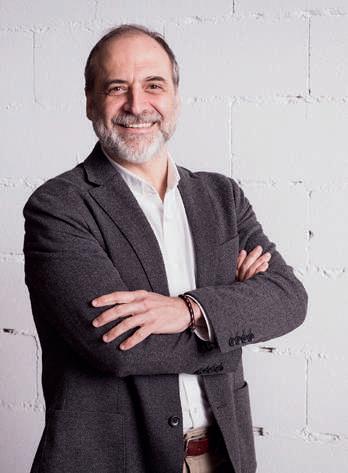
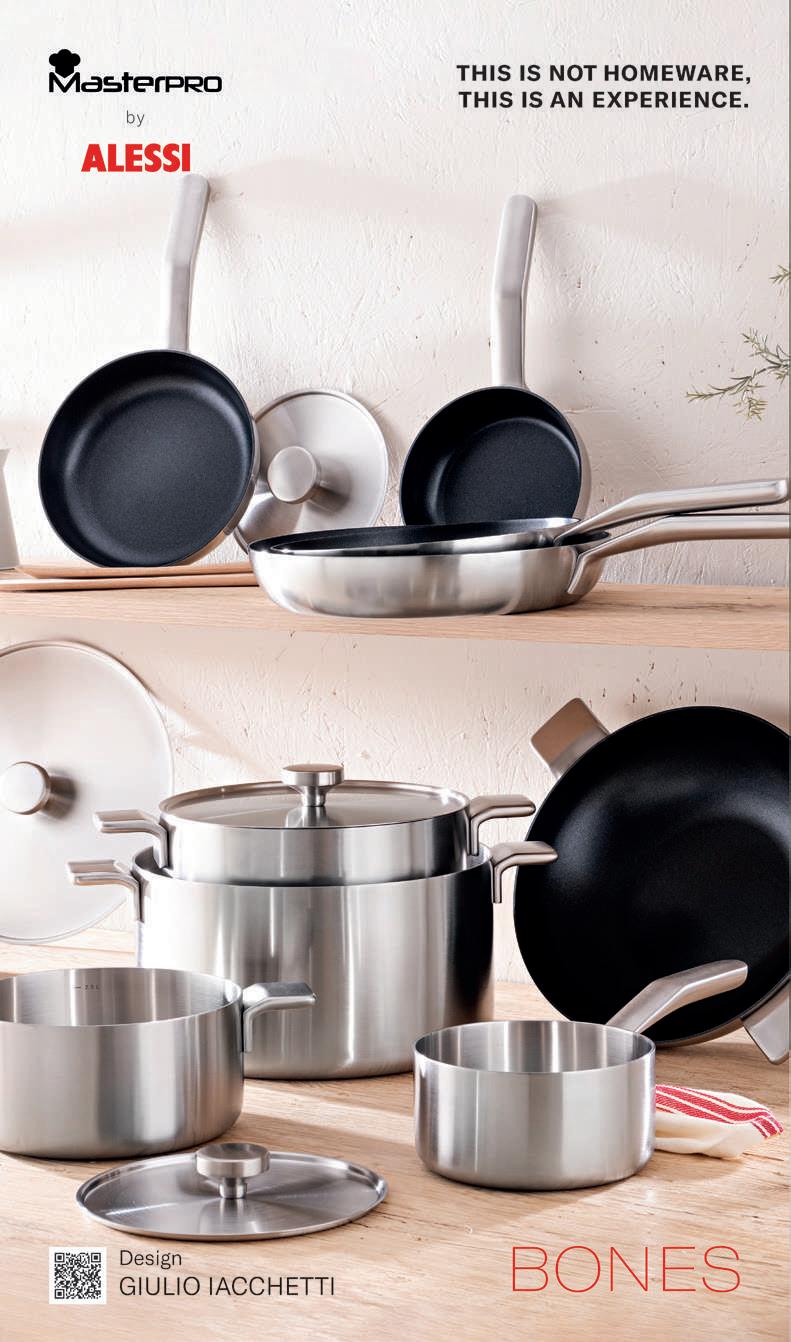

ONE-ON-ONE WITH / DE TÚ A TÚ CON
Michael Katz
Cook & Chef Institute Ambassador
Embajador de Cook & Chef Institute
Michael Katz (Jerusalem, 1970) is a chef, teacher and food writer. During his 33 years in the culinary world, Michael has worked in three Michelin-rated restaurants; owned his own restaurant and occupied the post of senior lecturer at various culinary schools, including the prestigious Le Cordon Bleu school in London. He has helped establish a cooking school in Mexico City, and served as executive chef for several high-profile restaurants in London and Israel.
In 2021, Michael founded his own cooking school in Israel called Attilio, in honour of his first mentor, chef Attilio Basso. In Attilio, he aims to create a community of professionals that is “supportive, motivational, filled with knowledge and learning, where everyone contributes knowledge, experiences, successes, errors, ideas and inspiration”.

- Who inspired your passion for cooking?
In my case, my desire for cooking was not inspired by a person or a situation, it was more the result of a “cold” analysis of what I wanted to do with my career. I loved working with my hands -since I was young I have loved building scale models and playing music-, so I knew it had to be something that allowed me to use them. And, eventually, chose to go after cookery.
Many years later it was clearer to me that cooking was not chosen by coincidence. I always loved the company of people and doing good for others. My father came everyday from work specially to cook for my brother and me, and I
Michael Katz (Jerusalén, 1970) es chef, profesor y escritor gastronómico. Durante sus 33 años en el mundo de la cocina, Michael ha trabajado en tres restaurantes con calificación Michelin; ha sido propietario de su propio restaurante y profesor titular en distintas escuelas de cocina, entre ellas, la prestigiosa escuela Le Cordon Bleu en Londres; ha contribuido a crear una escuela de cocina en Ciudad de México y ha ejercido como chef ejecutivo de varios restaurantes de alto nivel en Londres e Israel.
En 2021, Michael fundó su propia escuela de cocina en Israel llamada Attilio, en honor a su primer mentor, el chef Attilio Basso. Desde Attilio aspira a crear una comunidad de profesionales “solidaria, motivante, llena de enseñanzas y aprendizaje, donde todos aporten conocimientos, experiencias, aciertos, errores, ideas e inspiración”.
- ¿Quién inspiró tu pasión por la cocina?
En mi caso, no fue una persona o institución, sino el resultado de un análisis consciente de qué quería hacer con mi carrera profesional. Me encantaba trabajar con mis manos –me apasionaba construir maquetas y tocar música cuando era joven–, por lo que supe que tenía que ser algo que me permitiera usarlas. Y, al final, me decidí por la cocina.
Muchos años más tarde comprendí que no había elegido la cocina por casualidad. Siempre amé la compañía de las personas y hacer el bien por los demás. Mi padre volvía del traba- was lucky to travel and enjoy food from many countries around the world since a young age. jo cada día expresamente para cocinarnos a mi hermano y a mí, y tuve la suerte de viajar y disfrutar de la comida de muchos países alrededor del mundo desde una edad temprana.
- What was it like to start working in restaurants with two and three Michelin stars?
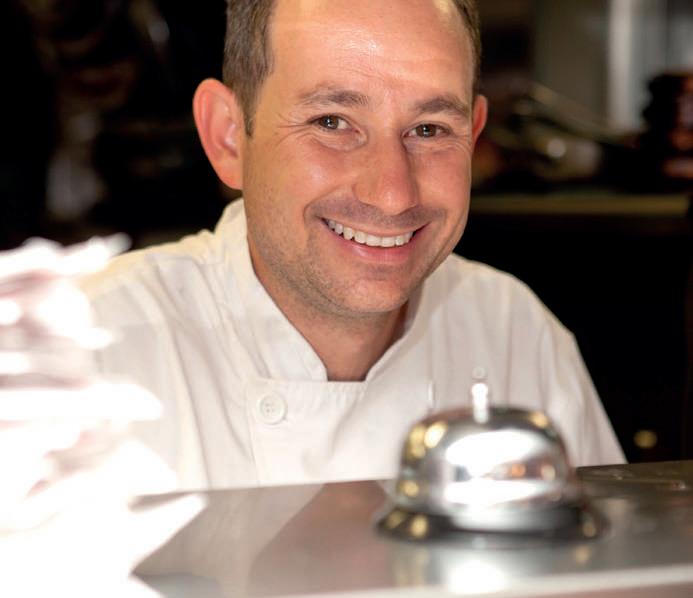
It took me a few years to really understand the impact of working in such establishments. The first kitchen I found myself was a two michelin star restaurant, so had nothing to compare it to, no standard of working or atmosphere references. But I was raised to always aim to the high, my parents told me its always easier to go down and harder to go up. Also, I started after three years in military service, and I found the kitchen very similar in many ways.
- The chef Attilio Basso became a great inspiration for you, to the point where you opened a cookery school named after him last year. How much of him is there in the chef that you are today?
I guess his spirit is all over the place. For me, Basso was more than a chef. He was a great personality, hard working, down to earth, always ready to teach and explain; and above all, he had respect for his workers, for his clients and for the ingredients he used. So it was clear for me and my business partner, Chico, that the school name would be “Attilio”.
- ¿Cómo fue empezar a trabajar en restaurantes de dos y tres estrellas Michelin?
Tardé varios años en comprender de verdad el impacto de trabajar en este tipo de establecimientos. Fue mi primera experiencia laboral, por lo que no tenía nada con lo que compararlo. Pero me criaron para apuntar siempre alto, mis padres siempre me decían que era más fácil caer que subir. Además, comencé después de tres años en el servicio militar y encontré la cocina muy similar en muchos aspectos.
- El chef Attilio Basso fue una gran inspiración para ti, hasta el punto de llegar a abrir una escuela de cocina con su nombre el año pasado. ¿Cuánto hay de él en el chef que eres hoy?
Supongo que su espíritu está en todas partes. Basso fue más que un chef para mí. Era una gran persona, trabajador, con los pies en la tierra, siempre preparado para enseñar y explicar; y por encima de todo, mostraba respeto por sus trabajadores, por sus clientes y por los ingredientes que usaba. Por ello, tanto mi socio Chico como yo tuvimos claro que el nombre de la escuela sería «Attilio».
- You are an important ambassador for Israeli cuisine. Tell us what is special about this gastronomy for you?
Israel is a very young country still finding its way. Its gastronomy is a mosaic that reflects the Jewish diaspora, and is very much influenced by local palestinian cooking, bedouin, drouze, syrian, egyptian, jordanian and many more countries. So, for me, israeli gastronomy is the binding substance between the cultures and society living in Israel and around its borders.
- You have also lived in London, Mexico, France… Have these places left their mark on your cooking style?
Travelling and living abroad influenced me a lot, not only when it comes to the cooking style, but also in the way I look at things and understand them, specially local traditions.
- Eres un embajador importante de la comida israelí. Cuéntanos, ¿qué tiene de especial esta gastronomía para ti?
Israel es un país joven que sigue buscando su camino. Su gastronomía es un mosaico que refleja la diáspora judía y que está muy influenciada por la cocina palestina, beduina, drusa, siria, egipcia, jordana y de muchos otros países. Así que, para mí, la gastronomía israelí es la sustancia vinculante entre las culturas y la sociedad que reside en Israel y alrededor de sus fronteras.
- También has vivido en Londres, México, Francia… ¿Han dejado estos países su huella en tu estilo de cocina?
Viajar y vivir en el extranjero me influyó mucho, no solo en el estilo de cocina, sino en la forma de ver y entender las cosas, especialmente las tradiciones locales.
“Travelling and living abroad influenced me a lot, not only when it comes to the cooking style, but also in the way I look at things and understand them.”
“Viajar y vivir en el extranjero me influyó mucho, no solo en el estilo de cocina, sino también en la forma de ver y entender las cosas.” think good attitude, harmony and good vibes start at the leader of the kitchen, the head chef. Harmony is not something you are born with, it’s something you grow or join into, you are guided into it. A good leader will show and guide the team and choose its “players” accordingly. have been very lucky to work with extraordinary chefs who shared their knowledge and wanted to pass their tradition, and I guess it made a great impact on me. So being able to share what I gained in life with young and experienced cooks, and witnessing what they do with that knowledge, makes me wake everyday with a smile and lots of enthusiasm.
- What is essential for a kitchen team to work and be in harmony?
- For the past few years, you have mainly dedicated yourself to consultancy and education. You have taught at different cookery schools, you have a blog for young chefs with over 170 published articles… What does teaching mean for you?
- Do you miss being among the stoves in the kitchen?
During my teaching career I’m cooking more than ever, I give hundreds of cooking demonstrations in front of the students, so this part is still with me. Though I do miss the vibes of a busy kitchen with a great team. guess it depends on how far we look at. I live right now in Israel, where the foodtech industry is booming: printed meat, lab grown meat, proteins from different sources, and much more, mainly for sustainability reasons. But I see also a vast growing of local small farms that are back in the game trying to produce high quality food and deliver it directly to the consumers. So think the future will have a balance between new technology and old traditions.
- ¿Qué es esencial para que un equipo de cocina trabaje y esté en armonía?
Diría que una buena actitud, la armonía y el buen rollo comienzan con el líder de la cocina, es decir, el jefe de cocina. La armonía no es algo con lo que naces, es algo con lo que creces o a lo que te unes, hacia lo que te deben guiar. Un buen líder enseña y guía al equipo y elige a sus «jugadores» adecuadamente.
- Te has dedicado al asesoramiento y formación en los últimos años. Has enseñado en diferentes escuelas de cocina, tienes un blog para jóvenes chefs con más de 170 artículos publicados… ¿Qué significa la enseñanza para ti?
He tenido la gran suerte de trabajar con chefs extraordinarios que han compartido su conocimiento y su legado y creo que eso ha tenido un gran impacto en mí. El poder compartir lo que he aprendido en la vida con chefs jóvenes y experimentados, y ver qué crean con ese conocimiento, hace que me levante cada día con una sonrisa y mucho entusiasmo.
- ¿Echas de menos estar entre los fogones de la cocina?
Estoy cocinando más que nunca durante mi carrera como profesor; realizo centenares de demostraciones culinarias delante de los estudiantes, así que esa parte sigue conmigo.
- In your opinion, and from your experience, what is the most vital thing a person starting their journey in the cookery world should know?
Like any profession that you want to enter and be good at, to be a chef there is a high price to pay: many working hours, commitment, persistence, practicing for many hours, low pay, investing in your education -whether going to a cooking school or buying inspiring books-, travelling if possible and being a long time away from home.
And bear in mind that there are no shortcuts, even if it sometimes looks like you can take them. Whoever wants a career in cooking should understand what cooking is all about, because it’s much more than just great tasty food and beautiful plates, it’s a way of life.
- What do you think the cooking of the future will be like?
Aunque sí que echo de menos la sensación de trabajar en una cocina ajetreada con un gran equipo.
- Según tu opinión y desde tu experiencia, ¿qué es lo más esencial que debería saber una persona que comienza su aventura en el mundo de la cocina?
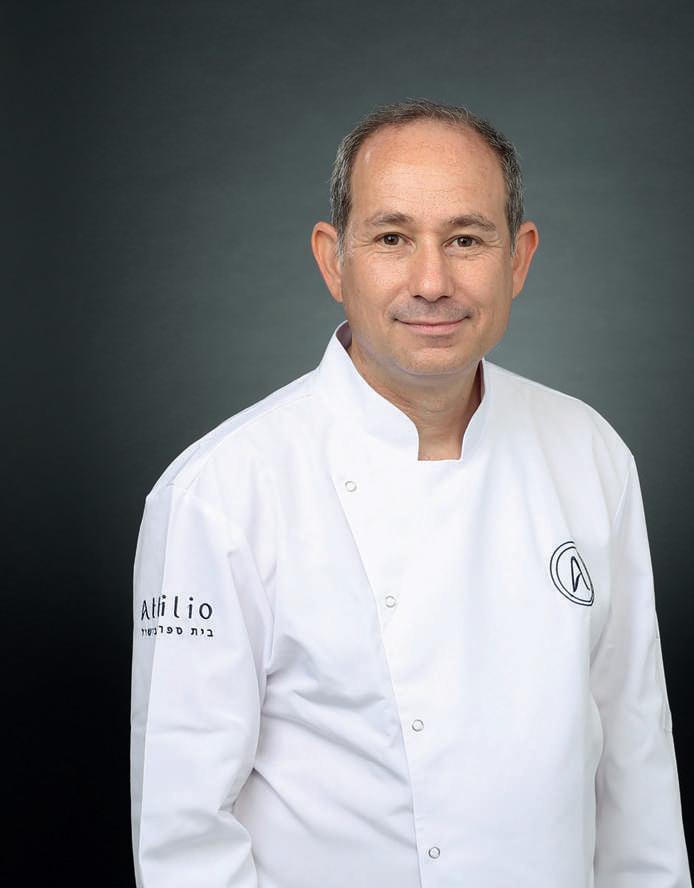
Como en cualquier otra profesión que elijas y en la que quieras ser bueno, convertirse en chef requiere un alto precio a pagar: mucho trabajo, compromiso, persistencia, practicar durante horas, sueldos bajos, invertir en tu educación –ya sea yendo a una escuela de cocina o comprando libros inspiradores–, viajar si es posible y pasar un largo periodo de tiempo fuera de casa.
Y tener en cuenta que no existen atajos, incluso si a veces parece que sí. Cualquiera que quiera labrarse una carrera en la cocina debe entender de qué se trata esta profesión, porque va mucho más allá de comida deliciosa y platos excelentes, es un estilo de vida.
- ¿Cómo crees que será la cocina del futuro?
Depende de cuán lejos queramos mirar. Ahora mismo vivo en Israel, donde la industria alimentaria está en auge: carne impresa o creada en laboratorios, proteínas de diferentes fuentes y mucho más, principalmente por razones de sostenibilidad. Pero también veo un enorme crecimiento de las pequeñas explotaciones locales que vuelven a la carga y tratan de producir comida de gran calidad y entregarla directamente a los consumidores. Por eso pienso que el futuro tendrá un equilibrio entre nuevas tecnologías y viejas tradiciones.
- If you only had 5 ingredients, what would they be and what recipe would you prepare with them?
Egg, white wine vinegar, trout, butter and fresh dill. I would make a warm smoked trout with a dill hollandaise.
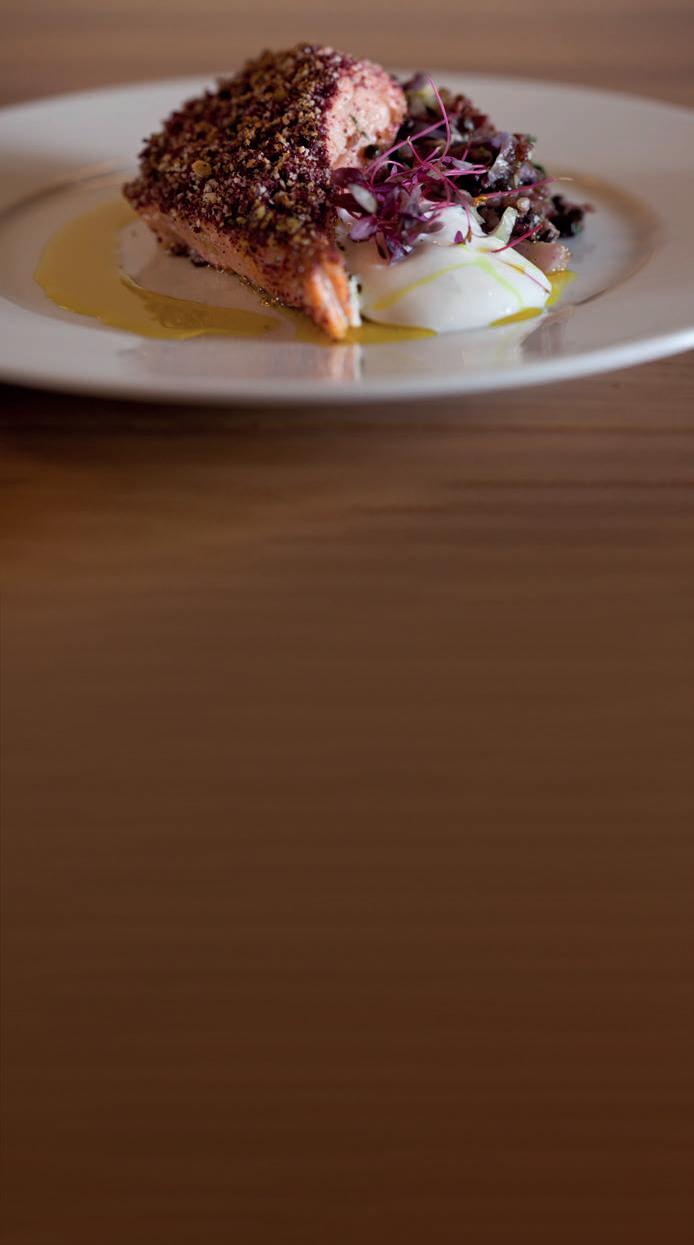
- Another of your passions is music. If you had to choose a soundtrack for your kitchen, what themes or styles would it consist of?
Wow, that is a tough question because I like many styles of music, but I guess it would consist of jazz and melody rock from the late 80’s and classical music, especially baroque style.
- Si solo tuvieras 5 ingredientes, ¿cuáles serían y qué receta prepararías con ellos?
Un huevo, vinagre de vino blanco, una trucha, mantequilla y eneldo fresco. Prepararía una trucha ahumada caliente con una salsa holandesa al eneldo.
- Otra de tus pasiones es la música. Si tuvieras que elegir una banda sonora para tu cocina, ¿de qué temas o estilos constaría?
¡Guau! Esa pregunta es de las difíciles, ya que me gustan muchos estilos de música, pero supongo que constaría de jazz, de rock melódico de finales de los años ochenta y de música clásica, en especial del estilo barroco.
“Whoever wants to have a career in cooking should understand what cooking is all about, because it’s much more than just great tasty food and beautiful plates, it’s a way of life.”
“Cualquiera que quiera labrarse una carrera en la cocina debe entender de qué se trata esta profesión, porque es algo que va mucho más allá de comida deliciosa y platos excelentes, es un estilo de vida.”









